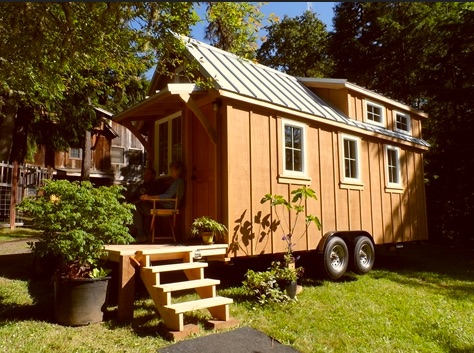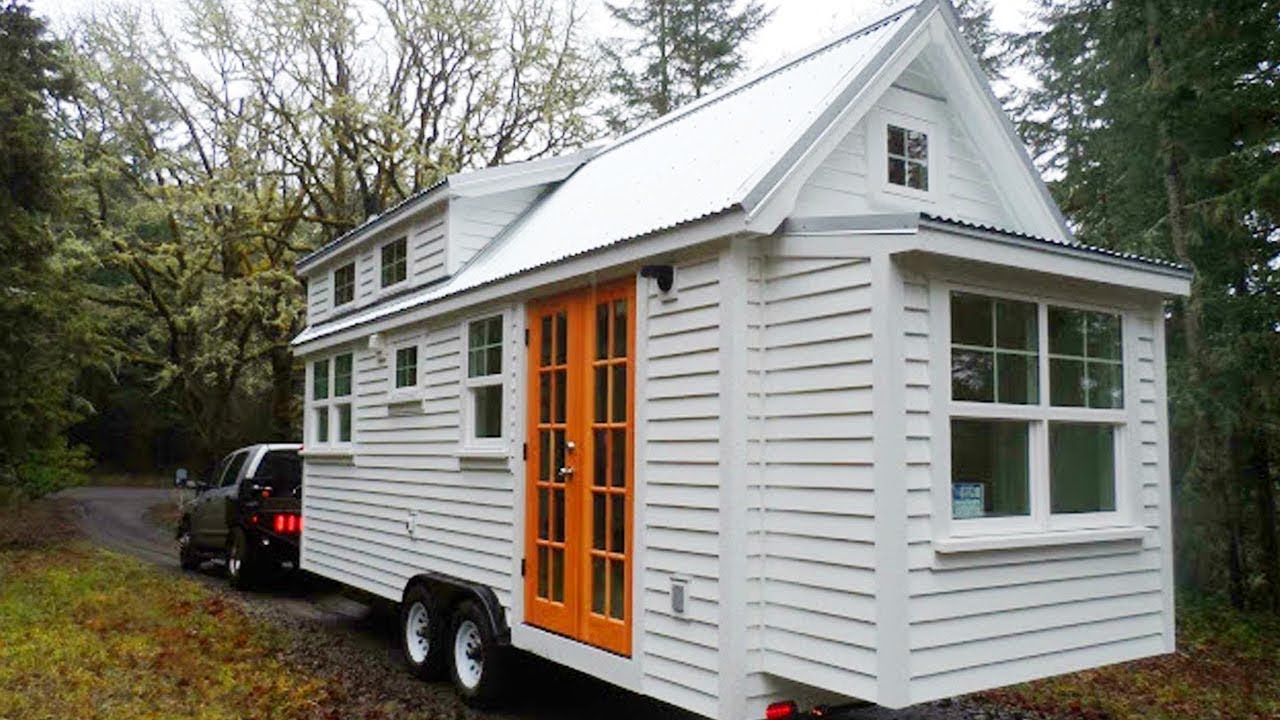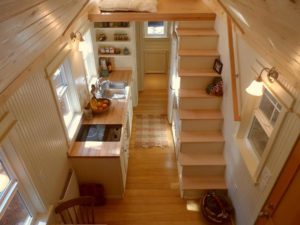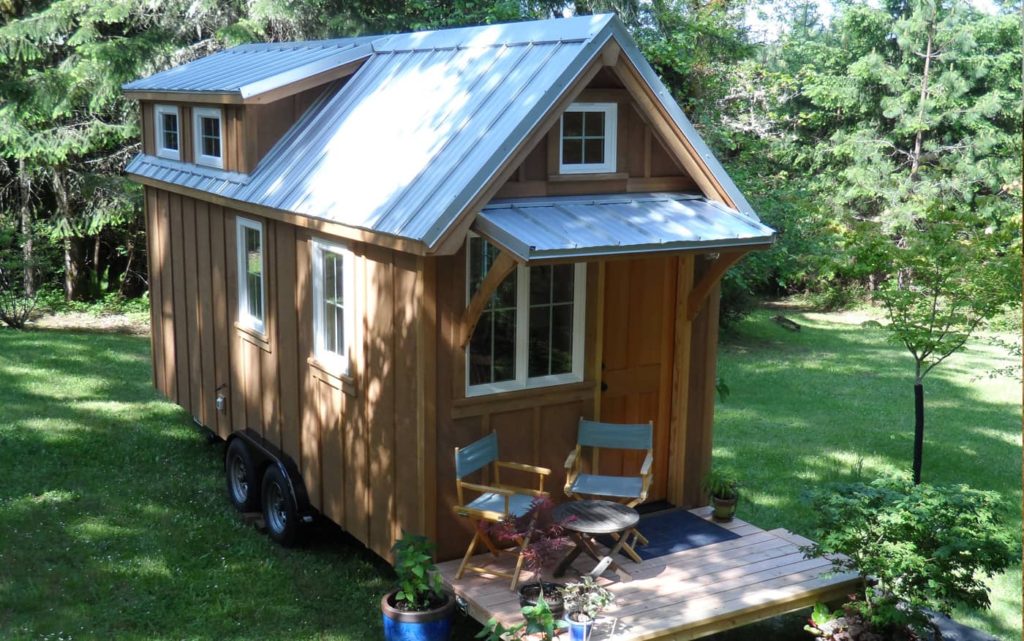THOWs Allowed In Outdoor Shelters, Church Parking Lots And RV And Mobile Home Parks
Portland, Oregon has developed the Shelter Housing Continuity Project to address the urgent need for more housing for the homeless, those that are transitioning from shelters to permanent housing, and the onslaught of new individuals becoming homeless because of the government shutdown.
New code changes are being considered and outdated policies, such as regulating how many people live in a household, to more allowances for tiny houses on wheels. One recreational vehicle or tiny house on wheels will be allowed on a residential lot as a replacement of an allowed accessory dwelling unit, provided it meets certain industry construction standards. Recreational vehicles and tiny houses on wheels would also be allowed in outdoor shelters, church parking lots, manufactured home parks, and commercial campgrounds.

Recreational Vehicles And Tiny Houses On Wheels
What are recreational vehicles and tiny houses on wheels?
They are vehicles, not buildings. The term is used to refer to campers, motor homes, vacation trailers, and fifth-wheel trailers. Tiny homes on wheels and park model recreational vehicles are also included. These are small homes built on a trailer, using a campsite style hook up for water, electricity, and sewer. Vehicles are regulated by the Oregon Department of Transportation’s Motor Vehicles Division and are not subject to state and city building codes. The current City code prohibits residential occupancy of vehicles, but enforcement of this prohibition is de-emphasized pending a decision on whether to loosen the prohibition.
Where will recreational vehicles and tiny houses on wheels be allowed?
One recreational vehicle or tiny house on wheels will be allowed on a residential lot as a replacement of an allowed accessory dwelling unit, provided it meets certain industry construction standards. This allowance:
- Acknowledges that many people already live in recreational vehicles or a tiny house.
- Provides a lower cost option for people who might not be able to afford to rent an accessory dwelling unit, apartment or house.
- Recreational vehicles and tiny houses on wheels would also be allowed in outdoor shelters, church parking lots, manufactured home parks, and commercial campgrounds.Why only one recreational vehicle or tiny house on wheels per residential lot?
- Under state law, two or more on any one lot is considered a campground, requiring a state license.
- In Portland, campgrounds or recreational vehicle parks are already allowed in commercial zones.
This one per lot limit does not apply to recreational vehicles and tiny houses on wheels in manufactured home parks.
How will utilities be provided to RVs and tiny houses on wheels?
The proposed code requires that a campground-style utility hookup be installed, with a plug for electricity and connections to City water and sewer.
Portland, Oregon Tiny Houses On Wheels

Project Purpose
Portland, Oregon- The Bureau of Planning and Sustainability, the Housing Bureau, and the Joint City-County Office of Homeless Services are partnering to review and retool City regulations to better address the homelessness crisis.
A range of approaches are being explored to better serve, shelter, and house Portlanders who are either experiencing — or are at risk of experiencing — houselessness. The Housing Bureau is continuing to build more apartments paired with supportive services for extremely low-income individuals and households The Joint Office of Homeless Services continues ramping up efforts to meet the increasing demand for emergency and short- term shelter, day storage, and hygiene facilities.
Expanding the options in the shelter-housing continuum are also being explored, such as campgrounds with tents or sleeping pods, tiny house villages, and micro-apartments with shared kitchens as well as other group living or housing arrangements.
The Bureau of Planning and Sustainability is developing proposals to change certain City Code requirements that would expand the housing and shelter options for individuals and households with extremely low incomes. Some of the solutions being explored will modify current permitting procedures, while others will require a new City Code to be established.
The goals of this project are to further fair housing laws, expand the range of shelter and housing options, and improve how the regulatory environment affects for-profit, nonprofit, and public-sector-shelter, and housing providers.
Portland Code Changes Being Considered Could:
- Promote more flexible household living arrangements.
- Remove barriers to the production or retention of single-room-occupancy (SRO) housing, group living arrangements, or small apartments with shared kitchens.
- Allow and regulate tent camping facilities and clusters of sleeping pods or “tiny homes” in certain zones.
- Increase allowances for “institutional” uses in residential zones (churches, synagogues, and mosques, for example) to provide shelter and services.
- Modify current rules for temporary activities needed to respond to natural disasters and emergencies.
- Adjust the siting regulations for temporary housing and shelters.
- Adjust the siting of day storage and hygiene facilities serving the houseless.
- Modify Design Review guidelines and other procedures for permitting affordable housing.
Project Background
On October 7, 2015, the Portland City Council declared a housing emergency to help address the city’s growing homeless and affordable housing crisis. The declaration by Council allowed for the expedited development of affordable housing projects and made it easier to provide service locations to people experiencing homelessness.
In partnership with Multnomah County and the Joint Office of Homeless Services, in 2017 the City committed to adding 2,000 units of Permanent Supportive Housing (PSH) to address chronic homelessness in our community. There are already 792 new units of PSH open or in progress now.
Affordable housing production remained at an all-time high in 2019 for the second consecutive year, with 878 new units — the most ever produced in a single year. Another 3,100 are currently in development. Portland’s Housing Bond has contributed to this robust response. Twelve projects, totaling more than 1,420 units of permanently affordable housing, are either open or in progress across the city since voters overwhelmingly approved the city’s first bond for affordable housing in 2016.
Despite this progress, 4,015 people were counted as experiencing homelessness on a single night this winter (2019). We must continue to focus our efforts strategically to address the homeless crisis.
Project Steps And Timeline
Project scoping and research — 2019
Code development — Spring 2020
Discussion Draft and Stakeholder Discussion — Summer 2020
Proposed Draft and Planning and Sustainability Commission hearings — Fall 2020
Recommended Draft and City Council hearings — Winter 2020/21
Effective date — March 2021
Project FAQ
The Shelter to Housing Continuum (S2HC) project addresses the urgent need to provide more options for those who are homeless – or could potentially experience homelessness – and facilitates transitions to permanent housing for housing-vulnerable Portlanders.
Al Burns Project Manager
A.*****@************on.gov
Shelter Housing Continuity Project

All Photos Courtesy: Oregon Cottage Company


Pingback: Oregon Regulation Of Tiny Houses - Tiny House Alliance USA